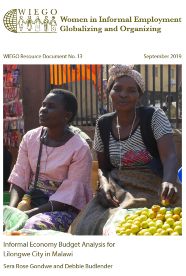Informal Economy Budget Analysis for Lilongwe City in Malawi – Resource Document 13
Transitioning from informality is increasingly recognized as one of the main development challenges worldwide. An estimated 89 per cent of employed people in Malawi are in informal employment, implying that transitioning from informality would contribute to improved livelihoods for many households.
This informal economy budget analysis was conducted to examine how budgets address the needs and interests of the informal economy workers, specifically focusing on market traders and vendors in Lilongwe City. Consultations with key stakeholders provided insights about the status of the informal economy. Budget allocations and expenditures for the years 2015/16, 2016/17, 2017/18 and approved estimates for 2018/19 were also analyzed.
View list of all: Resource Documents

